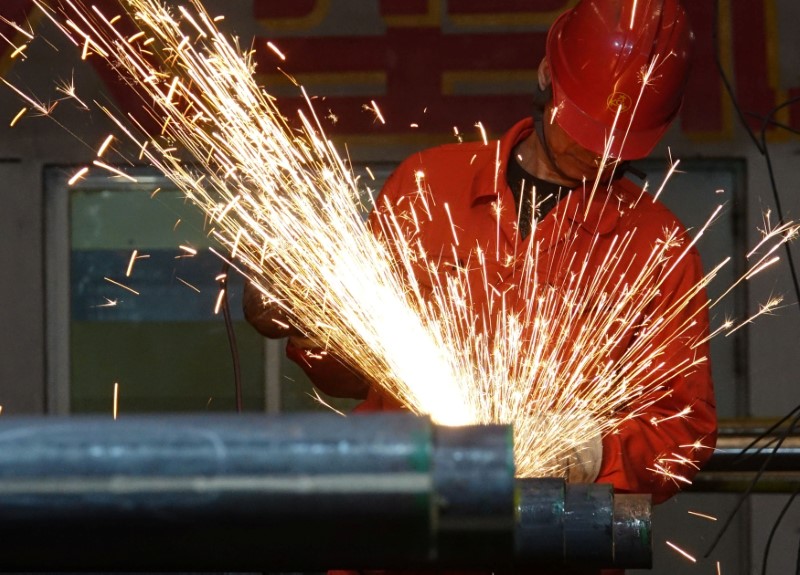BEIJING (Reuters) - China's manufacturing sector expanded at a steady pace in May as a pick up in production and domestic business offset a second month of declines in new export orders, a private survey showed on Friday.
The Caixin/Markit Manufacturing Purchasing Managers' index (PMI) was unchanged at 51.1 in May from April, and just above economists' forecast for a slowdown to 51.0.
It remained above the 50-point mark that separates growth from contraction for the 12th consecutive month.
The output sub-index rose to 51.8 in May, a three-month high, while manufacturers also saw stronger domestic order growth and increased their purchases of inputs.
The Caixin survey suggests China's factories have maintained solid overall growth despite the government's war on industrial pollution, a slowing housing market, and trade tensions with the United States.
Indeed, an official PMI released on Thursday showed the vast manufacturing sector grew at the fastest clip in eight months, signaling broad economic resilience even though many analysts expected pressure on growth in coming months from rising financing costs and the global trade friction.
Manufacturers in May were more optimistic about future growth prospects, the Caixin survey found, though there could be uncertainty about external markets as a reading on export orders was in contraction for a second month.
China's exports have maintained solid growth this year, in-line with broad strength among Asia's big exporters, though the rate of expansion has slowed from last year.
But the United States, China's largest export market, said this week that it will continue to pursue action on Chinese imports, including tariffs, just days after Washington and Beijing announced a tentative solution to their dispute and suggested that tensions had cooled.
"The index for new export orders picked up in May, but remained in contraction territory, reflecting that the export situation was still grim," Zhengsheng Zhong, director of Macroeconomic Analysis at CEBM Group, said in a note accompanying the survey.
Inflation pressures are picking back up, as higher commodity prices pushed up input prices at the fastest pace in three months, the survey found, with CEBM's Zhong saying industrial products price gains can help boost manufacturers' profits.
Manufacturers were able to raise their sales prices at the fastest pace this year, indicating stronger downstream demand was allowing factories to pass along most of their cost increases.
Indeed, the spread of the input price sub-index over the output price sub-index was the lowest since October 2016.
An employment sub-index showed Chinese factories continued to shed workers, as companies said they were looking to cut costs.

(For graphic on China economic indicator dashboard, click: https://tmsnrt.rs/2lQ48De)